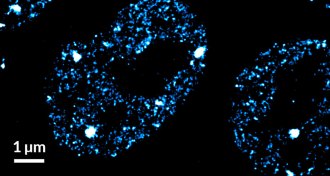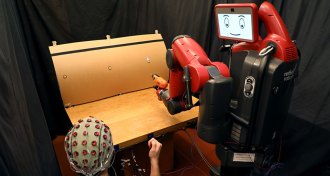All Stories
-
 Health & Medicine
Health & MedicineWhat is it about hogweed — and lemons and limes — that can cause burns?
Some plants have compounds that, after exposure to sunlight, produce streaky or spotty burns.
-
 Animals
AnimalsHow a squishy clam conquers a rock
Old boring clam research is upended after 82 years.
By Susan Milius -
 Health & Medicine
Health & MedicineNew studies add evidence to a possible link between Alzheimer’s and herpesvirus
Researchers saw higher levels of herpesvirus in the brains of Alzheimer’s patients, which may contribute to plaque formation.
-
 Anthropology
AnthropologyKoko the gorilla is gone, but she left a legacy
An ape that touched millions imparted some hard lessons about primate research.
By Bruce Bower -
 Life
LifeHere’s how drinking coffee could protect your heart
Coffee’s heart-healthy effects rely on boosting cells’ energy production, a study in mice suggests.
-
 Physics
PhysicsEinstein’s general relativity reigns supreme, even on a galactic scale
Scientists have made the most precise test of Einstein’s theory of gravity at great distances.
-
 Life
LifeIt may take a village (of proteins) to turn on genes
Clusters of proteins transiently work together to turn on genes, new microscopy studies of live cells suggest.
-
 Anthropology
AnthropologyA 2,200-year-old Chinese tomb held a new gibbon species, now extinct
Researchers have discovered a new gibbon species in an ancient royal Chinese tomb. It's already extinct.
By Bruce Bower -
 Neuroscience
NeuroscienceSplitting families may end, but migrant kids’ trauma needs to be studied
The long-term effects of separating children from their parents at the U.S. border need to be studied, scientists say.
-
 Health & Medicine
Health & MedicineHow to help your toddler be helpful (with caveats)
Even very young toddlers like to help, a social skill that’s linked to later success in school and life.
-
 Animals
AnimalsEach year painted lady butterflies cross the Sahara — and then go back again
Painted ladies migrate the farthest of any butterfly.
-
 Tech
TechWith this new system, robots can ‘read’ your mind
Giving robots instructions via brain waves and hand gestures could help the machines operate more safely and efficiently.